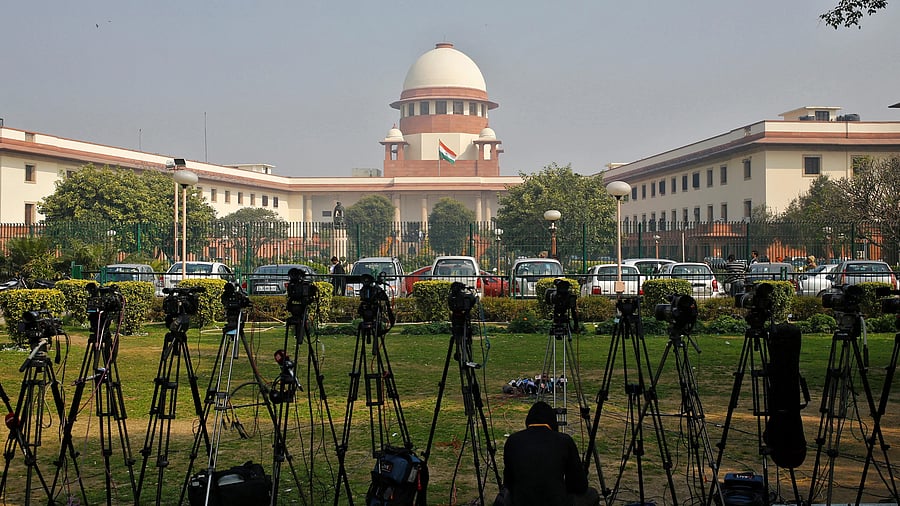
A television journalist sets his camera inside the premises of the Supreme Court in New Delhi.
Credit: Reuters Photo
New Delhi: A 5-year-old Supreme Court order on the controversial Char Dham road widening project has come under fresh questions from a group of concerned citizens led by two veteran politicians, Murli Manohar Joshi (BJP) and Karan Singh (Congress), who have appealed to the Chief Justice to “review and recall” the judgement for protecting “whatever little is left to save”.
In their letter to Chief Justice B R Gavai, the group comprising politicians, environmentalists and scientists said the top court in 2021 had declared an “unscientific and irrational circular” by the Union government under the excuse of defence needs, as sacrosanct for constructing the Himalayan roads, but past experience have shown that it was “counterproductive”.
At the core of the controversy was the government’s plan to widen nearly 900 km of roads in an ecologically sensitive valley to connect the four famed Hindu religious sites – Kedarnath, Badrinath, Gangotri and Yamunotri – collectively known as Char Dham.
The Union Ministry of Road Transport and Highways, without conducting any environmental impact assessment and ignoring the recommendations of an expert panel, decided for a DL-PS (double lane-paved shoulder) formula of 10 mt tarred roads and 12 mt formation width for the Himalayan roads.
In the process, it violated its own 2018 circular that suggested 5.5 mt of tarred surface for hills and mountains because of the unsuitability of tarred roads.
When the matter was challenged before the top court, a bench headed by then CJI Justice DY Chandrachud upheld the ministry’s amended circular mandating 10 mt of tarred roads for feeder highways going to the border areas, arguing that the defence needs could not be second-guessed.
“After about five years, the result has seen massive landslides, sinking zones and other fragile zones created on highways all along due to enormous destruction of trees, forest cover and hill slopes,” says the letter signed by Joshi and Singh from two opposite sides of the political spectrum.
"All the strategic routes like Badrinath, Gangotri, Pithauragarh are frequently blocked and are often unusable in the monsoon season, while remaining risky and landslide prone throughout the year."
"Moreover, since the construction of Char Dham road widening project, these otherwise stable routes are being hit by massive and chronic landslides blocking all defence and local movements towards the border for several days with a new study revealing four landslides every five kilometres causing fully or partially road-blocking along the Rishikesh-Badrinath highway."
The letter signed by Joshi, Singh and 57 others, comes ahead of the construction of a controversial 8 km bypass road following the DL-PS formula in the highly vulnerable Bhagirathi Eco Sensitive zone.
“The Uttarkashi-Gangotri stretch, (in) the Bhagirathi Eco-Sensitive Zone, is the only pristine portion remaining of the entire Ganga. A DL-PS road if constructed in this stretch also, on the justification of defence requirements, will wreak avoidable damage in this extremely fragile stretch, which is already witnessing unprecedented disaster events this year,” the letter notes.
